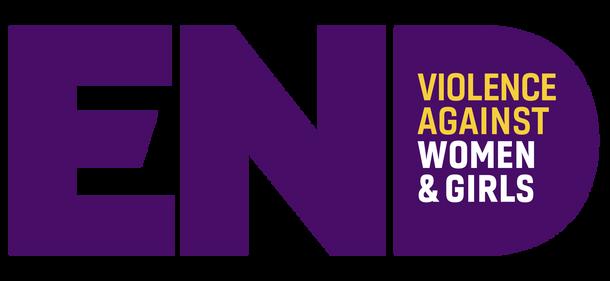

RAISE YOUR VOICE

Challenging sexual harassment and violence at home, in the work place, and in society.
SexualHarassmentintheWorkplace
Since2023,RaiseYourVoicehasbeencontractedto delivertotradeunionsrepresentativesandtheLabour Relations Agency, including ICTU (Irish Congress of TradeUnions),NIPSA,UNITEtheUnionGBandNorthern Ireland,UNISON,andNASUWTTheTeachers’Union.To markInternationalWorkers’Daywebeganasocial media campaign to raise awareness of workplace sexualharassmentandwhatweallcandoaboutit.
ViolenceAgainstWomenandGirlsandHomelessness
RaiseYourVoicepartners,ledbyWRDA,servedas steeringgroupmembersfortheCommunityFoundation NI’sworktolookattheintersectionandlinkbetween VAWGandHomelessnessAspartofthiswork,CFNIand thesteeringgroupcommissionedresearchonthelink whichhighlightedseveralrecommendationsforchange Alongsidethisresearchamultimedia‘ShifttheShame’ campaignwaslaunchtohighlightthe#StepsToSafety forwomenfacingviolenceandhomelessness WRDAalsocarriedoutanotherpieceofresearchby MeganMcClure-Botha.Bothpiecesofresearchfound thatinadequatehousingsupplyandgenderinequality weremaincauses.
StalkingAwarenessWeek
Theweekbeginning21stAprilwasStalkingAwareness week,Eventhoughwenowhavelegislationthatallows forstalkingtobeprosecuted,westillneedtoraise publicawarenessofthesignsofstalkingandwhat actionweallcantaketotackleit.
Checkouttherestofthisissuetolearnmoreabout whatRaiseyourVoicehasbeenupto!
New campaign aims to highlight the intersection of violence against women and homelessness and ‘Shift the Shame’ from the victim.
AnewcampaignaimstoShifttheShame of violence-led homelessness from the victim to the perpetrator. The campaign demands that Northern Ireland works togethertoshapesomekeyStepstoSafety that will protect women from the compounding cycle of homelessness in NorthernIreland.
Statistics show that last year in Northern Ireland the police were called to a domesticabuseincidentevery16minutes andthattherewere4,000sexualoffences recorded Almost 70% of victims of domesticabusecrimesarewomen Thirty womenandgirlswerekilledbymeninthe lastfiveyears
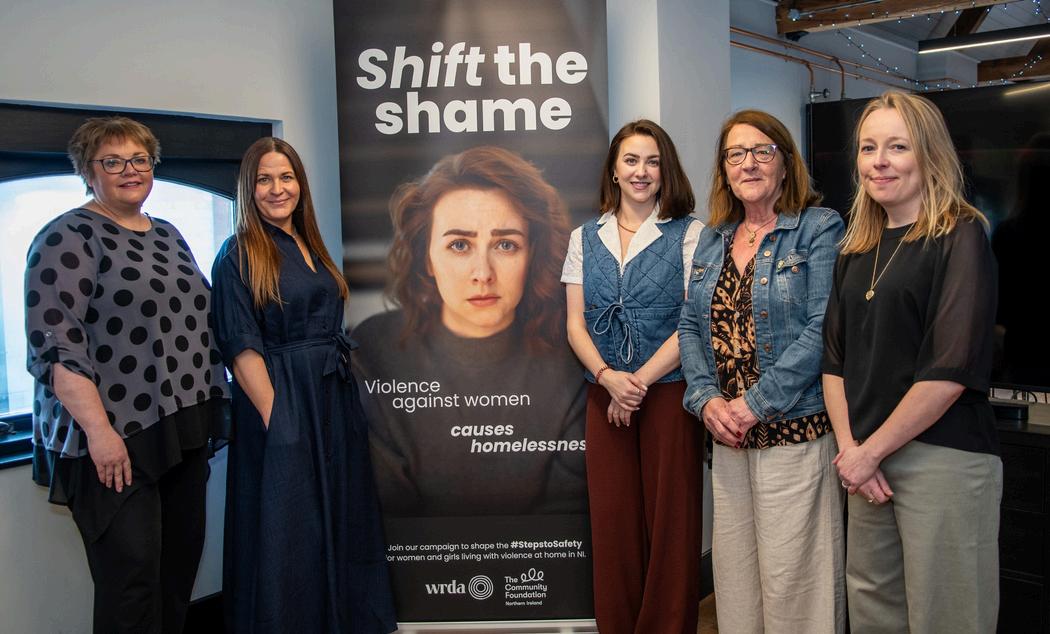
The Shift the Shame campaign, organised by the WRDA with funding from the Community FoundationofNorthernIreland,waslaunchedintheofficesofFouruminBelfast TheSteering CommitteeincludedRaiseYourVoice,BMEWomen’sNetwork,Start360andHEReNI.
ThecampaigncallsforstructuralchangeinNorthernIreland,askingtheauthoritiesfromhousing, police,healthandeducationtoworktogetherandshareresponsibilitytopreventhomelessness amongwomenandchildrenatanearlierstage.
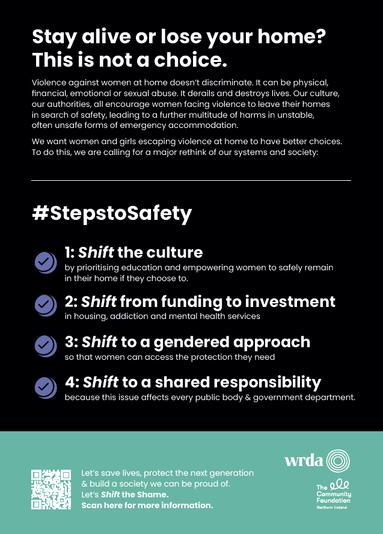
Organisers call for a number of practical ‘Steps to Safety’ solutions including for the Department of Justice to act urgently so that women facing violence can access protection orders and ensure thattheyareeffectivelyenforced.Forthosewhoare forced to leave home, there should be appropriate housingoptionsforwomenwithcomplexneeds.
A detailed new web page is now available on the WRDAwebsiteanditincludesapowerfulnewvideo created by Belfast creative agency Fourum with a script by acclaimed playwright Louise Mathews. The Shift the Shame campaign movie was created with the help of 31 women with lived experience of violence and homelessness in Northern Ireland Playwright Louise Mathews then proudly translated theirwords.
The video and special web page highlighting this issueisavailableat wwwwrdanet/stepstosafety
Fromlefttoright:DawnShackles,LouiseMatthews,DebraHill,Anne McVicker,CatherineMinford,atthelauncheventinFourum
Fundamental cultural change is needed to address domestic violence related homelessness
By Megan McClure Botha, Communications and Membership Worker, WRDA
Recent research by the Women’s Resource and Development Agency highlights that women in Northern Ireland (NI) who escape domestic violence often face homelessness and prolonged housing insecurity due to fragmented services, insufficient housing, and gender inequality. The primary causes of this issue are inadequate housing supply and the economic vulnerability women face because of gender inequality. While improving coordination between domestic violenceandhomelessnessservicesisimportant,itwillnotresolvetheissueunlesstheunderlying causes are addressed. The need for cultural change to dismantle patriarchal structures is emphasised, as is the necessity for policies that go beyond just improving coordination and individualinterventions.
Using an intersectional lens, the research reveals that multiple forms of oppression, such as motherhood, migration controls, and working-class status, exacerbate women ' s vulnerability to domestic violence and homelessness. Data indicates that domestic violence-related homelessness is increasing in NI. Specific issues in the region, such as the high occurrence of alcohol-related domestic violence, underreporting to the police, and the influence of paramilitaries,contributetotheseverityoftheproblem.ThelegacyoftheConflictstillaffectsthe natureofdomesticviolenceinNI
The report suggests a wide range of measures to reduce domestic violence-related homelessness, including fundamental cultural change Key actions include a committed funding expansion for alcohol treatment and improved mental health services, as alcoholism in NI often results from unmet mental health needs and contributes to severe domestic violence There should also be efforts to build trust in policing, particularly in Loyalist and ethnic minority communities Legal alternatives to the criminal justice system should be improved to reduce reliance on paramilitary justice Training on applying Section 5 of the Criminal Justice Act and Equality Impact Assessments (EQIAs) for relevant staff is needed All these measures require securedfundingbeforeimplementation.
Building on existing good practices, such as paid leave and salary advances for Trust staff affected by domestic violence, is essential. The Executive Office Ending Violence Against Women andGirlsStrategyservesasamodelforgenderedpolicymaking,andasimilarapproachshould beusedtoupdatetheNIHEHomelessnessStrategy.
The report also outlines best practices for employers to support domestic violence victims/survivors, including providing paid leave, salary advances, and workplace relocations, as wellasensuringthatharassmentisaddresseddiscreetlyandsafely.Employersshouldclarifythe applicationofSection5oftheCriminalJusticeActandutiliseprofessionalinterpreterstrainedin domestic violence awareness, who should not be relatives or close acquaintances of the service user.
The research identifies gaps in understanding, such as the experiences of disabled women, the Trans community, and the impact of paramilitarism on domestic violence, particularly in the Loyalist community. Rural women and class-based analysis are underrepresented in research, highlightingareasthatneedfurtherexploration.
ThisresearchwasoriginallypresentedasathesisaspartofanMScinSocialPolicyinSeptember 2024fromUlsterUniversity
Violence Against Women and Homelessness research
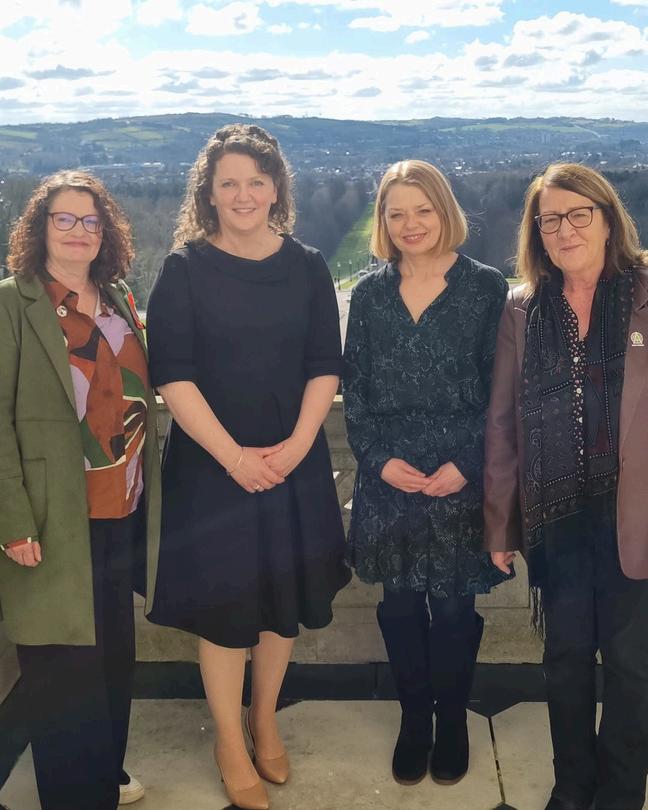
Rase Your Voice lead partner WRDA was a key stakeholder in recently launched research explores the link between violence against womenandgirlsandhomelessnessinNorthern Ireland Commissioned by the Community Foundation for Northern Ireland with funding from Oak Foundation, the research was carried out by Dr Lynne McMordie and Professor Suzanne Fitzpatrick at I-SPHERE, Heriot-Watt University, along with Professor Sarah Johnston from the University of Edinburgh Read the executive summary on the Community Foundationwebsiteatthelink below.
communityfoundationni.org/wp-content/uploads/2025/03/Violence-Against-Women-and-Homelesness-_-FinalVersion_Summary.pdf
Spotlight on Raise Your Voice work with Trade Unions
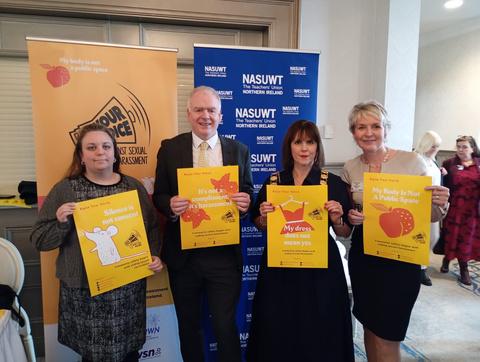
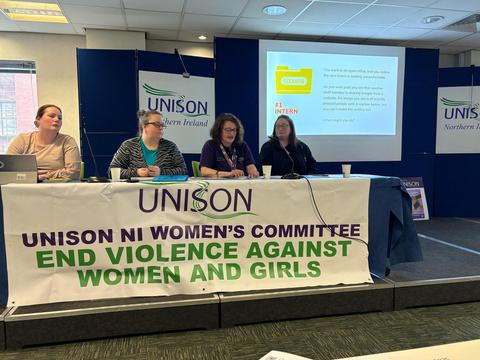
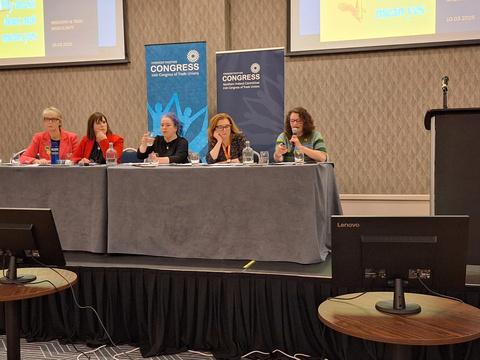
Raise Your Voice hosted a stall at the NASUWT conference where we spoke to many teachers about our work and the issues they see in their workwithyoungpeople Theteachingunionalso heard a presentation from The Executive Office team on the Ending Violence Against Women andGirlsStrategy.
As part of the International Women’s Day programme Raise Your Voice delivered a series of workshops to UNISON members covering Sexual Harrassment, tacking misogyny, and an update on recent legislative developments on violenceagainstwomenandgirls.
During the Irish Congress of Trade Unions Women’s Seminar in Dundalk Raise Your Voice teammemberHelenCrickardspoketodelgates about our work and how we can all tackle misogyny to play a part in changing societal attitudesandculture
From left to right: Helen Crickard, Lynne McMordie, Suzanne Fitzpartick, Anne McVicker, attheresearchlauncheventinStormont
The Trade Union Movement is taking action on Sexual Harassment
By Helen Crickard, Project Coordinator, Reclaim the Agenda
The Trade Union Movement is the largest civil society organisation in the world, founded on campaigning for workers’ rights, fair pay, equal pay, holiday pay, health andsafety,thebasicrightsthatkeepworkerssafeandpaidwellfortheirlabour
TheIrishCongressofTradeUnions(ICTU)hasmembersacrosseverytradeunion,civil servants, health, education and community and hospitality, from construction to finance, that are all affiliated to the ICTU and they have a very strong and vocal Women’sCommittee SexualHarassmenthasnotescapedtheTradeUnionmovement, overthelastfewyearsithasbeenveryactiveinchallengingsexismintheworkplace For those who have an outdated view of Trade Unions, that they are dominated by men, dismissive of issues outside of pay and overtime, they couldn’t be further from the truth. Unison, NIPSA, CWU, Unite the Union, and NASUWT all led by women who are notlettingthisproblemslipaway,theyareraisingawarenessandbringingsolutions
IthasbeentheworkoftheWomen’sCommitteethathasputsexualharassmentinthe workplace at the top of Trade Unions agenda. Sexual harassment has been so normalised in our society to the point where women often brush it off or don’t care to notice when they witness it, as it’s a daily occurrence However, in the workplace we have laws to protect, policies that outline these poor behaviours that are unacceptable,longgonearethedayswhenpostersofnakedwomenwereallowedin any tearoom or staff room, but some of these outdated attitudes remain within workforces,wheresomefinditacceptabletobesexistormisogynistanddisguiseitas humour. The Trade Union movement will not tolerate sexist jokes or banter that degradesanddehumaniseswomenorindeedanyoneandtheywillfindnosympathy amongtheirunionmembersforthesebehaviours
The recent Bi-annual Delegate Conference had multiple motions on Sexual harassment and sexual violence, calling for policy changes, support for victims and survivorsofDomesticViolenceandverystrongsupportfortheculturalchangetoshift the blame and shame on the abusers Motions calling for anti-sexual harassment training to be mandatory and like safeguarding training, carried out annually to drill home there is no place for misogyny in the workplace. There was a demand for a Statutory code of practice for employers to prevent and respond to misogyny, sexual harassmentandvictimisationwithintheworkplace.
Some workplaces the harassment comes from the public, those in hospitality, retail, tourism, can be more exposed to abuse and the law is clear on protecting workers from abuse, providing they feel safe to report. Whistle blowing on cases of sexual harassmentarebeingsupported,whiletheabuseisoftensomeoneofahighergrade, long standing in the company, a respected member of the team, well, let us be clear none of those traits will provide cover for sexual harassment We are a trade union movementthatwillnotstepoverthisabuse,weareamovementthatwillnottolerate it,andwewilltakeaction.
What is Workplace Sexual Harassment
and What Can Be Done About It?
WhatisSexualHarassment?
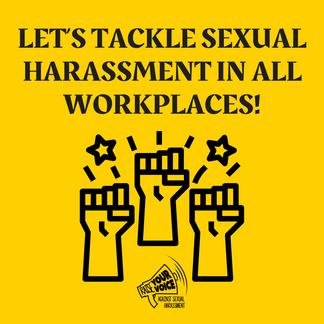
Sexual harassment is any unwelcome sexual advance, request for sexual favour, verbal or physical conduct or gesture of a sexual nature, or any other behaviour of a sexual nature that might reasonably be expected or be perceived to cause offence or humiliation to another, when suchconductinterfereswithwork,ismadeaconditionofemploymentorcreatesanintimidating, hostileoroffensiveworkenvironment Whiletypicallyinvolvingapatternofbehaviour,itcantake theformofasingleincident.
Sexualharassmentmayoccurbetweenpersonsoftheoppositeorsamesex.
UNWomen-Prohibitionofdiscrimination,harassment,includingsexualharassment,andabuseofauthority
Howprevalentissexualharassment?
Sexualharassmentistargeteddisproportionatelyatyoungwomen,sexualandgenderminorities, andwomenwhoaremarginalisedanddisadvantaged.
Womenfacingmultiple formsofdisadvantagecanbebothan‘easiertarget’becausetheyhave lesspowerthanothersandalsoamorelikelytargetbecauseofsocialprejudiceandstereotypes, aswellasperceptionthattheirsuccessintheworkplacethreatensthecurrentsocialorder. Almostseveninten(68%)disabledwomenreportedbeingsexuallyharassedatwork,compared to52%ofwomeningeneral
Ethnicminorityworkers(womenandmen)reportedhigherrates(32%)ofsexualharassmentthan whiteworkers(28%)overthelast12months
A poll of LGBT+ workers found that 68% had experienced some form of harassment in the workplace
FawcettSociety-TacklingSexualHarassmentintheWorkplace
Howcan employerscombatsexualharassmentintheworkplace?
Believevictimsandadoptazerotoleranceapproachtosexualharassment
Implementastandalonesexualharassmentpolicy
Ensurerelevantstaffmembersaretrainedtohandlecomplaintsofsexualharassment
Improveequality,diversity,inclusionintheorganisationatseniorlevels
Conductaclimatesurveyonsexismandsexualharassment
ReviewICTUandLRA‘EliminatingSexualHarassmentfromtheModernWorkplace’report
DeliverBystanderInterventionTrainingthroughagenderedlens
Whattodoifyouarebeingsexuallyharrassedatwork?
Speaktoatrustedfriendorfamilymember.
Keeparecordofwhathashappenedtoyou
Speak to your line manager, or if they are the harasser, to a more senior manager or to the HR department.
SpeaktoyourTradeUnionRepresentative.
Keeparecordofsexualharassmentincidents,keepingcopiesofmessagesandemailsifapplicable Iftheproblemisnotresolved,makeaformalcomplaintusingyourworkplacegrievanceprocedureor thereportingprocedurewithinyourworkplaceanti-harassmentpolicy(ifthereisone)
Iftheissueisstillnotresolved,youmaybeabletotakeittoanemploymenttribunal. Iftheharassmentiscriminal,youcancontactthePolice.
AdaptedfromUNISON-Sexualharassmentisaworkplaceissue
Stalking Awareness Week 2025
By Elaine Crory, Women’s Sector Lobbyist
The week beginning 21st April is Stalking Awareness week, and this year the theme was ‘SpottingStalking’ Thisthemeisimportanttothinkabout,becauseeventhoughwenowhave legislationthatallowsforstalkingtobeprosecutedasthecrimethatitis,wehavealongway togowithregardtorecognisingitaswhatitis.
One of the challenges comes from the fact that culture is very slow to change; stalking has been in common parlance for a long time, but in law only for a short time This causes a disconnect; while the law changed in Northern Ireland in April 2022, we are still seeing very lownumbersofprosecutions.Someofthisseemstoberegardingthetraininggiventobodies likethePSNIandthePublicProsecutionService;weneedtobesurethattheyareadequately trained in how stalking manifests in order to be able to recognise it when it is reported and prosecute it accordingly. The other side of this equation is public awareness; often survivors areunsureabouttherealityofwhattheyareexperiencing,andthingssometimesescalatea lot before they report to police These two issues then collide if the survivor is told that the incidents described may not meet the criteria for a stalking charge. This can lead to confusion about what the legislation is supposed to do – as well as confusion about the meaningofstalking.
When Raise Your Voice worked with the Women’s Policy Group to carry out research on stalking in Northern Ireland in 2021, we found that almost half of respondents (47.34%) never reported their experiences, indicating a lack of confidence. We also found the following commonthemes:
Reportstoagenciescomingquitelateintothepatternofbehaviour,becauseofamixture of fear of disbelief, embarrassment, a hope it would “all go away”, and taking some time torealisewhatwashappening,
EmployersputtingpracticalsupportsinplaceatahigherratethanUniversitiesorSchools, Familymembersbeingforcedtoprovidepracticalhelpwherepolicedidnot, Reportshappeningonlywhennecessityhasforcedthemduetoescalation
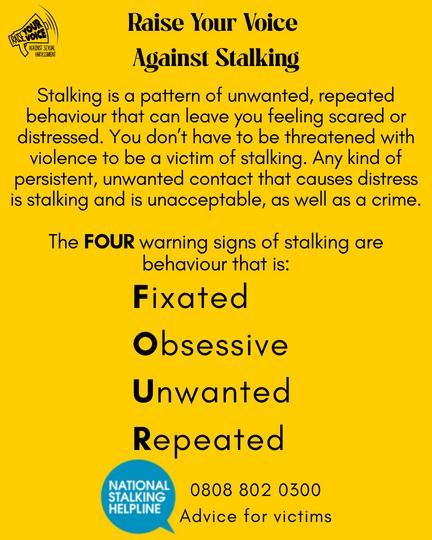
This picture has not changed overnight, and no legislation is powerful enough to do that With that said, effective legislation is buffered by a public awareness programme and by proper training for the bodies that deal with complaints. These have been lacking, but NI is now in the process of developingaStalkingGroupthatwillworktofillthe gaponpublicawarenessandseektoengagewith therelevantstakeholderswithregardstotraining It isearlydaysatthisstage,butweareinvolvedand hopetohavemoretoreportsoon.
Raise Your Voice marked Stalking Awareness Week through sharing information on our social media and we encourage you to have a read, learn and sharewithyournetworks.
Step by step, we can build awareness of this awful crime
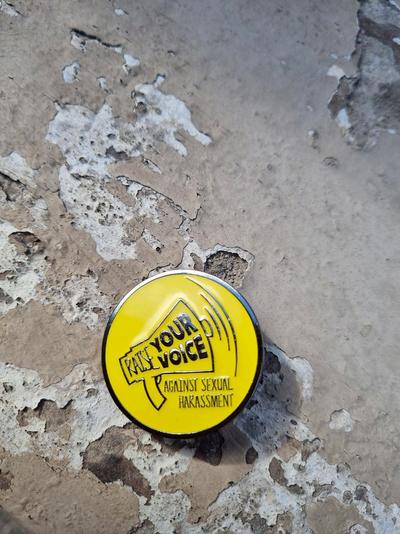

Women’s Resource and Development Agency is pleased to be one of the 8 organisations delivering on the NI Executive’s Regional Change Fund to End Violence Against Women and Girls, expanding our Raise Your Voice Project with partners RTA, WSN, and NIRWN
This publication is grant aided by Belfast City Council and TEO The views expressed are not necessarily shared or endorsed by the Council The Council does not accept any responsibility or liability for same
The Executive Office (TEO) EVAWG Programme runs the Change Fund through Belfast City Council (BCC) which contributes to this publication; in doing so, TEO/EVAWG hold no responsibility for the content and are not necessarily endorsing all content used







